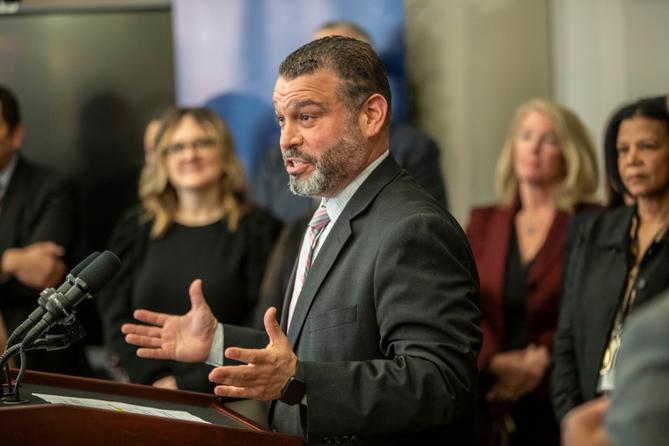Spotlight PA is an independent, non-partisan newsroom powered by The Philadelphia Inquirer in partnership with PennLive/The Patriot-News and other news organizations across Pennsylvania. Sign up for our free weekly newsletter.
HARRISBURG — Pennsylvania’s top education official will leave his post this fall, just weeks into what promises to be an extraordinarily challenging school year for districts statewide as they grapple with the coronavirus pandemic.
Education Secretary Pedro Rivera will become the next president of Thaddeus Stevens College of Technology on Oct. 1, the Lancaster-based school announced Tuesday. He will serve in his current position until then.
“As we all prepare for the upcoming school year during unprecedented times, I am reminded every day of the exceptional leadership we have in the education community, that even under challenging conditions, these leaders and educators continue to serve students and communities equitably and with understanding,” Rivera said in a statement.
“While leaving this position was a difficult decision, I am comforted that my new role allows me to continue to serve Pennsylvania students and continue to advocate for equity, access, and opportunity for all.”
Gov. Tom Wolf said he plans to nominate Noe Ortega, deputy secretary and commissioner for postsecondary and higher education, to replace Rivera.
“His leadership has been critical during the commonwealth’s response to COVID-19,” Wolf said of Rivera in a statement, “and the relationships he cultivated with education stakeholders during his tenure have strengthened the ties between state and local partners, and allowed local schools to inform state education policy.”
Rivera became secretary of the Department of Education in 2015. During his tenure, Pennsylvania adopted a formula designed to ensure equitable funding for districts, though it only applies to a fraction of the money state lawmakers appropriate every year for education.
The way the state funds schools is the subject of a lawsuit led by the Education Law Center and Public Interest Law Center against legislative leaders, state education officials, and Wolf. Rivera was superintendent of the Lancaster School District when it joined the case as a plaintiff, but as education secretary, he became a defendant. He is expected to give a deposition.
“I think he has exhibited a strong commitment to equity and providing all children a high-quality education,” Dan Urevick-Ackelsberg, an attorney on the case, said of Rivera. “But when the legislature deprives you of the power to give those districts what they are most lacking — funding — your ability to implement meaningful change is severely limited.”
In recent months, Rivera has overseen the closures of public and private schools statewide to slow the spread of COVID-19, and is now tasked with guiding districts on how to safely reopen.
The state’s Education and Health Departments in July released guidance that reminds districts that masks are required inside schools, and directs them to implement policies that keep six feet of distance between students and staff. Difficult decisions — like whether to teach students in person, online, or through a hybrid model — have been left to individual districts and superintendents.
The Philadelphia and Pittsburgh School Districts have opted to begin the school year fully virtual, while other large districts plan to offer options.
“I know there continues to be great uncertainty regarding the pandemic and its impact on our communities, but I am hopeful that this health-focused guidance will serve as an additional resource to help you plan,” Rivera wrote in a memo announcing new guidelines for schools.
While some local officials have bristled against statewide mandates that limited business operations and required masks in public areas, those in charge of schools are seeking more hands-on involvement from the state.
“Amidst a backdrop of rapidly changing guidance and direction, school superintendents have spent the summer leading their districts through an emotionally charged public discernment process — one many of them feel was unfairly put upon their districts,” Mark DiRocco, executive director of the Pennsylvania Association of School Administrators, wrote in a recent op-ed. “While the state has emphasized a need for local decision-making, school leaders have questioned time and again why decisions about public health have been placed in the hands of educators.”
John Sanville, superintendent of the Unionville-Chadds Ford School District, told Senate lawmakers during a recent committee hearing that the guidance offered by state and federal officials has been “conflicting or left to localities to interpret the true meaning.”
“They’ve left local schools in the unenviable task of making public health policy decisions, which is clearly not our wheelhouse,” Sanville said. “What is clear is that there is no perfect solution.”
100% ESSENTIAL: Spotlight PA relies on funding from foundations and readers like you who are committed to accountability journalism that gets results. If you value this reporting, please give a gift today at spotlightpa.org/donate.

